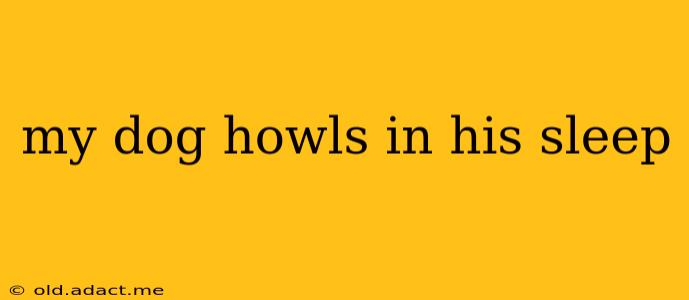It's a common experience for dog owners: you're drifting off to sleep, only to be jolted awake by your canine companion's sudden howl from their slumber. While it can be startling, a dog howling in their sleep is usually nothing to worry about. Understanding why this happens can ease your concerns and help you better understand your furry friend's dreams and sleeping patterns.
Why Does My Dog Howl in His Sleep?
The most common reason for sleep howls is dreaming. Just like humans, dogs experience REM (Rapid Eye Movement) sleep, the stage associated with vivid dreams. During this stage, dogs may vocalize, twitch, or even paddle their legs, mirroring the actions happening in their canine dreams. These dreams can be triggered by recent experiences, such as a vigorous play session, an exciting walk, or even an interaction with another animal. The howl is simply a manifestation of their dream-world activities.
Is My Dog in Pain When He Howls in His Sleep?
While dreaming is the most likely culprit, pain or discomfort can also contribute to nighttime vocalizations. If your dog's howling is accompanied by other symptoms like whimpering, restlessness, limping, changes in appetite, or unusual behavior during waking hours, it's crucial to consult your veterinarian. These could be signs of an underlying medical condition requiring professional attention. Don't hesitate to seek veterinary care if you're concerned about your dog's well-being.
How Can I Tell if My Dog's Howling is Due to Pain or Dreaming?
Differentiating between dream howls and pain-related vocalizations can be challenging. Dream howls tend to be short, isolated events occurring during REM sleep, often accompanied by other sleep-related movements like paw twitching. Pain-related vocalizations, however, are usually more prolonged, frequent, and accompanied by other signs of distress. Observe the context of the howling and any accompanying symptoms to help determine the cause.
What Breeds of Dogs Are More Prone to Sleep Howling?
Certain breeds, known for their vocal nature, may be slightly more likely to howl in their sleep. However, any breed can experience sleep howls. It's less about breed predisposition and more about individual temperament and sleep patterns. Observing your dog's personality and sleeping habits can give you a better understanding of the frequency and intensity of their sleep howls.
My Dog Howls in His Sleep Frequently: Should I Be Concerned?
Occasional sleep howls are usually not cause for concern. However, if the howling becomes frequent, intense, or accompanied by other troubling symptoms, it's advisable to schedule an appointment with your veterinarian. They can conduct a thorough examination to rule out any underlying medical issues.
Can I Stop My Dog From Howling in His Sleep?
Unfortunately, there's no surefire way to completely stop your dog from howling in their sleep. Trying to wake them up might disrupt their sleep cycle and even cause them stress. The best approach is to create a calm and comfortable sleeping environment for your dog, ensuring they feel safe and secure. A consistent bedtime routine, a comfortable bed, and a quiet sleeping area can all contribute to more restful sleep for both you and your furry friend.
Conclusion: Understanding Your Dog's Sleep Howls
While a dog howling in their sleep can be a bit unnerving, it's often a harmless byproduct of dreaming. However, monitoring your dog's overall health and behavior is essential. If you notice any concerning changes, don't hesitate to consult your veterinarian. By understanding the potential causes and observing your dog's behavior, you can better address any sleep-related concerns and ensure your canine companion enjoys peaceful and restful nights.
